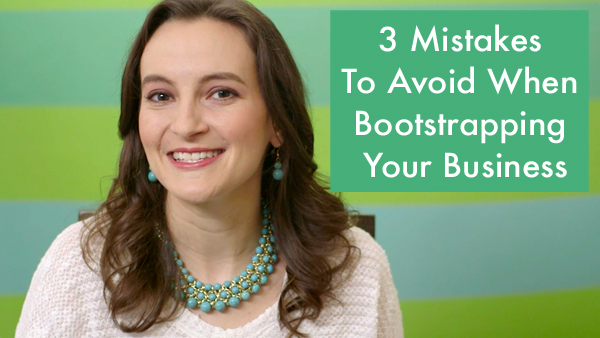
The definition of bootstrapping your business is to use existing resources to go from startup to successful enterprise.
Most of us solopreneurs and small business owners don’t pitch our companies to big venture capitalists to raise funds, and as a result we tend not to grow as quickly. But we also retain full ownership over our businesses, and that means we get to call the shots.
Bootstrapping Your Business? Watch this.

So what are the 3 biggest mistakes I’ve noticed and experienced myself while bootstrapping my business? Here they are.
1. Not having enough startup capital
This is a pretty obvious one, but if you don’t have enough money in your bank account to pay your rent or put food on the table, your business isn’t going to survive very long.
In this situation, I’ve seen people give up on their businesses entirely. Another approach might be to get a “bridge job” where you work in someone else’s business or in a regular dollars for hours job to make ends meet while you grow your business on the side.
The definition of a bridge job is that it isn’t a full time gig that zaps your energy. It’s also usually not another business where you are required to get clients and make sales for it to support you.
During this phase of your business, you’ll want to focus on bringing money into your business as quickly and easily as you can, so you can phase out of your bridge job. But there’s nothing wrong with taking on a part time contract to help cover expenses while your business is starting up.
2. Having too much startup capital
What? You might be wondering how having too much startup capital could be a bootstrapping mistake. Well, technically it’s not a problem unless having a lot of money in the bank keeps you complacent.
This was the case for me when I first started my business right out of college. I had the good fortune of having paid internships during college and I graduated debt free, with enough money in the bank to feel safe and secure for many months.
As a result, I didn’t do the daring things in my business that would have really gotten me the clients, experience, and money I needed to build my business right from the get go.
I ended up spending most of this money buying information products, and not implementing what I was learning. Trust me when I say that I believe in the power of knowledge and training, but I just wasn’t taking things seriously enough to put things into practice and put myself out there fully as a business owner.
It wasn’t until my startup stash had all but dwindled and I made a big investment into a high level mastermind program that I finally got my butt into gear and started making serious money in my business.
3. Paying yourself at the right time
Investing in your business is usually a necessary thing. It’s part of the entrepreneurial path to invest time and money into something when you don’t know whether it will work or not.
As a bootstrapper, you’re likely hardwired to re-invest all of the income from your business back into it, to help it grow and prosper. I certainly was, and for many years while my business income was increasing, my net at the end of the year wasn’t.
It wasn’t until I recognized that I had to pay myself like a regular employee that I realized my bootstrapping mistake.
If you don’t pay yourself a salary, and you believe that you’re working for free as you build your business… you might end up with a rude awakening when you need to hire someone to replace you or close down your business, with little to show for it in your personal bank accounts.
Paying yourself a fair market wage out of your company means that you treat your business with respect, and it treats you with respect too. It helps you make better hiring and outsourcing decisions, because you know what the value of your time is worth to the company.
It also makes things easier at tax time, and can even save you money – definitely check with your accountant and attorney on how best to approach this topic.
So these are my biggest realizations around successfully bootstrapping your business.
What are your tips for bootstrapping your business?
Now I’d love to know what you’ve learned along the way about growing a business from scratch – any tips and tricks you’d like to pass along to your fellow entrepreneurs?
Leave a comment below!


